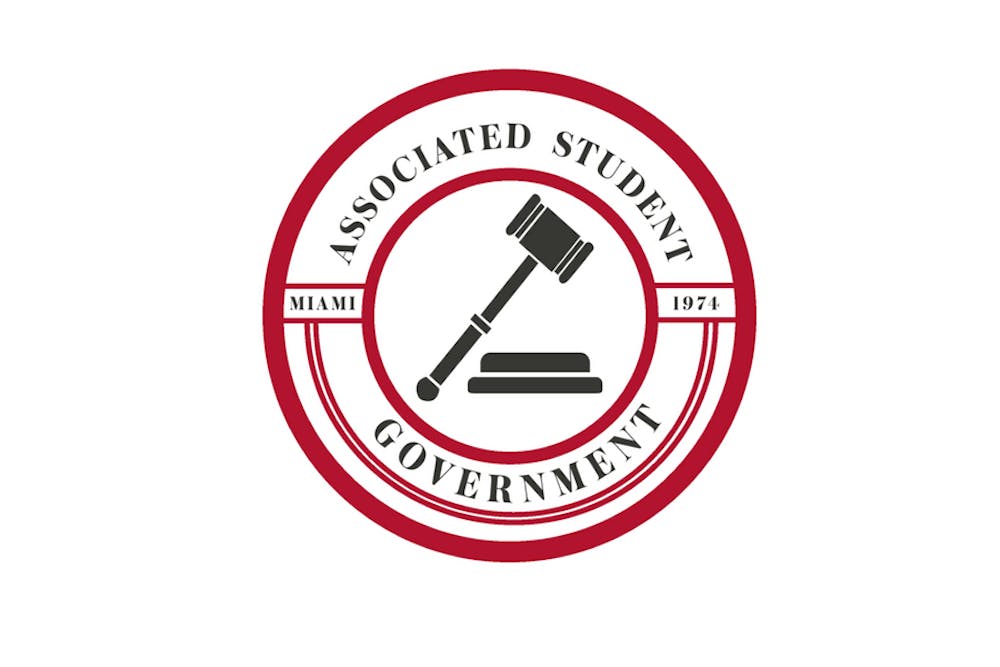On April 11, Miami University’s Associated Student Government (ASG) introduced a resolution calling for the university to officially adopt the International Holocaust Remembrance Alliance’s (IHRA) definition of antisemitism.
Although it is now tabled for next semester, news of this resolution prompted students from Miami’s Students for Justice in Palestine (SJP) and the Muslim Students Association (MSA) to publish a joint statement urging ASG to not pass the resolution on the grounds that, per the statement, the definition “attempts to malign and politically gaslight the Palestinian struggle.”
ASG Senator-at-large Matthew Lodge, a sophomore political science major, was one of the authors of the resolution. He said the purpose of the resolution was to help people identify antisemitism, which has been on the rise over the past year.
“Antisemitism is very insidious. It looks very different depending on where it's coming from, and there isn’t a rhyme or reason to it,” Lodge said. “Consequently, it’s important to have an all-encompassing definition to capture lived experiences of Jews.”
According to both the IHRA website and the ASG resolution, the IHRA defines antisemitism as “a certain perception of Jews, which may be expressed as hatred toward Jews. Rhetorical and physical manifestations of antisemitism are directed toward Jewish or non-Jewish individuals and/or their property, toward Jewish community institutions and religious facilities.”
However, this is not the issue that MSA and SJP took with the resolution. Rather, they objected to an example of antisemitism under the IHRA definition.
The IHRA website lists “claiming that the existence of a State of Israel is a racist endeavor” as an example of antisemitism under the grounds that it denies “the Jewish people their right to self-determination.”
The issue at stake lies with whether or not this example connects anti-zionism — finding issues/flaws with the establishment of a Jewish state — to antisemitism.
Lauren Somers, a junior studying fashion and business analytics, is the president of Hillel at Miami. She explained that anti-zionism and antisemitism were completely different things.
“Not a lot of people know about this, but you can be anti-zionist without being antisemitic,” Somers said. “You can be entirely Jewish and committed to your identity and not know anything about or support Israel.”
Whitney Fisch, the executive director of Hillel, agreed with Somers. She said the IHRA definition was intended as a guideline for identifying antisemitism instead of citing certain topics as prohibited speech.
“There are definitely ways to criticize Israel without being antisemitic — I’ve criticized Israeli government and military in the past,” Fisch said. “[The IHRA definition] is a tool. It’s not legal. It’s a tool to be used in conjunction with thoughtful reflection and context per the situation.”
Enjoy what you're reading?
Signup for our newsletter
Some students at Miami, however, believe this is a tool that can be used to shut down speech advocating for Palestinian rights and anti-zionist views.
“Basically, the problem is that the IHRA definition has been largely weaponized against students and organizations speaking out for Palestine in the past,” Allison Sifri, the president of Miami’s SJP, said. “When the Department of Education adopted [the IHRA definition] in 2018, you can see groups in other colleges across America that speak out for Palestine being targeted more.”
Jacky Linden, a junior majoring in diplomacy & global politics and history, is a member of SJP and agreed with Sifri that the definition had potential for weaponization, regardless of its intentions or whether it is legally binding.
“[The definition] can be weaponized. That is our problem with it,” Linden said. “I’m sure the people who wrote this didn’t have the intent to censor people, but it’s too vague and invites very right-wing views that can be problematic towards us.”
Linden cited an article detailing the problems the original author had with the definition’s application and its potential for misuse by right-wing groups. She said that connecting anti-zionist statements with antisemitism is counterproductive to the work of some human rights organizations today.
“The Human Rights Watch, Israel’s Law Professors Forum and UN special rapporteurs in Palestine all claim that the state of Israel is committing apartheid,” Linden said. “By the IHRA definition, all the aforementioned orgs and people could be seen as antisemitic and that shows how this definition can be weaponized and how it is used to silence real critiques that are agreed upon by some of the most prestigious human right organizations in the world.”
Sifri, who helped write the letter responding to the resolution, said it was created because they didn’t learn about the resolution until the day before it was originally set to be voted on.
“We decided to [write the letter] because … the resolution was posed to ASG as something that wouldn't cause any controversy or uproar,” Sifri said. “We saw that it didn’t have any attention, so we wanted everyone to know our concerns with it. The handful of senators I talked to didn’t know anything about the controversy.”
Controversy is not just related to the definition, however. In response to the statement released by SJP and MSA, Hillel posted a statement on Instagram criticizing the statement as “an attempt to redefine antisemitism to suit [SJP and MSA’s] needs as a non-Jewish organization.” Hillel said ASG’s resolution wasn’t legally binding and did not create official prohibited speech.
“The purpose of the [Hillel statement] was to attempt to actually put a factual lens on to call out the hypocrisy and inaccuracies of the letter,” Fisch said. “It was also created to give information to Jewish students and anyone who is frustrated or confused by [the SJP and MSA statement].”
There were also concerns that SJP and MSA were trying to secretly pass around the statement in order to make sure it didn’t appear on the radar of Jewish organizations. Sifri said this was due to time constraints and a misunderstanding. Since the organizations thought the resolution would be voted on a day or two after they learned about it, they had to rush out a statement.
“Since the letter was kind of a last minute thing, we only had a day to act before the bill was voted on,” Sifri said. “It wasn’t very organized, and based on what I know, I believe this was misconstrued because one person said something wrong to another person.”
There is still ongoing debate from both sides about whether or not the IHRA definition of antisemitism would be used to shut down free speech at Miami and whether this is possible in the first place. In the midst of this dialogue, however, Somers said it’s important to listen and respect other groups.
“The main goal is to never spread hate to other groups,” Somers said. “Both sides of any story are always valid to hear. From my point of view, we’re all a community, so we should come together and listen to each other instead of always assuming things.”




